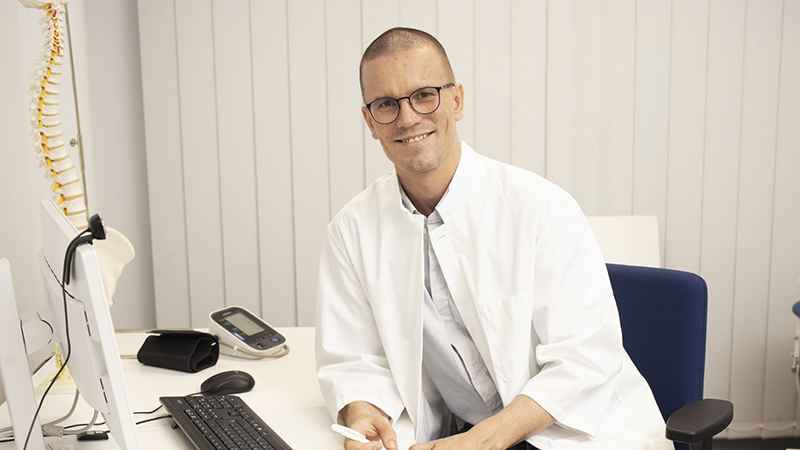AI is coming - we are ready

I argue that AI will do some of the work of a doctor in the near future. But I don't yet know what those jobs will be exactly.

For ten years, I have been developing scalable solutions to the mismatch between supply and demand in healthcare. I am particularly interested in the interface between healthcare and the customer, where interaction plays an important role. For example, when building chatbots, we have relied on manual algorithms and the interaction has been structured and clunky. The ability to respond to open text has been difficult to implement.
That's why I'm so excited about ChatGPT, which can understand and produce conversational text. I can see that now the word AI is gradually starting to live up to the expectations that have been placed on it. And I would argue that, in line with Gartner's hype curve, within a decade, AI like ChatGPT will surpass even current expectations - although a small death spiral of hype is expected in the next few years.
Humans are needed because AI cannot learn empathy - or can it?
One of the key controversies in healthcare has been that humans are needed because AI cannot learn empathy. In response, I have argued that if empathy can be defined, what is stopping us from creating empathic AI?
In the past, I myself thought that the human level of empathy will not be reached. Building algorithm-based rules for empathy has been laborious, and the hit rate for generating empathy has not been very good.
Study finds AI can already beat doctors in empathy
How wrong I was. AI can already outperform doctors in empathy in a single task. This was shown in a recent North American study (Ayers et al. 2023) comparing AI and telemedicine responses to patients' questions.
In the study, doctors and AI answered the same anonymous online questions without any background information and the quality of the answers was assessed. The questions were not straightforward, but related to common issues that arise in general practitioner consultations: for example, accidents, abnormal laboratory tests, or potentially serious symptoms such as arrhythmia.
The most surprising finding, in my opinion, was related to empathy. The number of messages rated as empathetic by AI was 45%, compared to only 4.6% by doctors. ChatGPT responses were also more often rated as medically benign.
The reasons why AI was perceived as more empathetic in the study may be related to the higher number of characters. The AI wrote four times as many words in responses as humans. This also fits with my own thoughts that the scalability of AI compensates for its other human shortcomings.
Will artificial intelligence replace doctors?
Will AI partially replace me in the future, should I be worried? No, I'm not. The oversupply in healthcare is so deep that I am happy to delegate tasks to AI where it is better than me. I, for my part, can deliver effectiveness in more demanding tasks that AI cannot yet do for me. The authors of the research article therefore suggest that further research should explore the use of chatbots to improve doctors' responses - not to compete, but to collaborate with AI.
We are also - at least for now - poor at tolerating mistakes made by AI. Despite the fact that, statistically, AI solutions would be safer than human intervention. The same challenge with another action: accidents caused by Tesla's autopilot are being made news, even though statistically the technology is already safer than human drivers.
Instead of artificial intelligence, we build supporting intelligence
On the other hand, the fact that we cannot tolerate mistakes made by AI pushes us to develop deployable solutions that are significantly safer than current solutions. As a result, the quality of healthcare will improve alongside productivity gains.
Indeed, the introduction of AI directly at the customer interface is still on the horizon for the future. But we are already well on the way to deploying AI: developing solutions that support the work of Terveystalo's professionals. We are not competing against AI, but working with AI - together we are stronger than alone. AI is coming, we are ready.
* Ayers JW, Poliak A, Dredze M, et al. Comparing Physician and Artificial Intelligence Chatbot Responses to Patient Questions Posted to a Public Social Media Forum. JAMA Intern Med. 2023;183(6):589–596. doi:10.1001/jamainternmed.2023.1838

Tuomo Oikarainen's role as Terveystalo's Digital health doctor combines three of his interests: he works at the interface with medical operations, digital development and business.
"Generative artificial intelligence has developed at an astonishing pace over the past year, and we can't even imagine how much it will affect the healthcare sector over the next decade."
Read more blogs

Let's reform occupational health together
Laura Karotie, SVP Corporate Health at Terveystalo, shares her initial observations on how occupational health can be developed in a customer-oriented and sustainable manner.

Here are the digital trends in healthcare 2025: AI frees up time and supports quality of care
Ilari Richardt, Director of Digital Services at Terveystalo, highlights five major digital trends that will transform healthcare this year. At the heart of these trends is the potential of artificial intelligence to solve healthcare problems.

Good medicine requires the right tools
Medicine, like many other sciences, is advancing by leaps and bounds. The fact that medicine guides our work means that we deliver the most effective care as recommended. This requires us to constantly evolve and keep ahead of the scientific curve, so that we can act in the best interests of our customers, using all appropriate and possible means.

Occupational health psychologists are underutilized amidst the tsunami of mental health issues
The increase in psychological problems and burnout at work is constantly being discussed. Mental health disorders are one of the major causes of decreased work efficiency, absenteeism, and transition to disability pensions. One might ask why this situation persists, despite the fact that our country has a unique and highly regarded occupational health care system, with a large number of experts in the connection between work and mental health – us occupational health psychologists.

Where there is love for medicine, there is love for humanity
Hippocrates' wise words help us make the right choices. Our commitment to our mission, working for a healthier life, extends beyond the provision of quality health services to the promotion of human rights throughout our value chain.

Together towards a healthier workplace: The power of occupational health partnership
A healthy workplace is the result of collective effort, and Finnish business decision-makers share this view. Customer Relationship Director Terhi Nieminen explains how Terveystalo focuses on proactive measures and multidisciplinary collaboration, supporting the well-being of workplaces and employees comprehensively. This way, we create value that promotes sustainable success and addresses the challenges of the future working life.